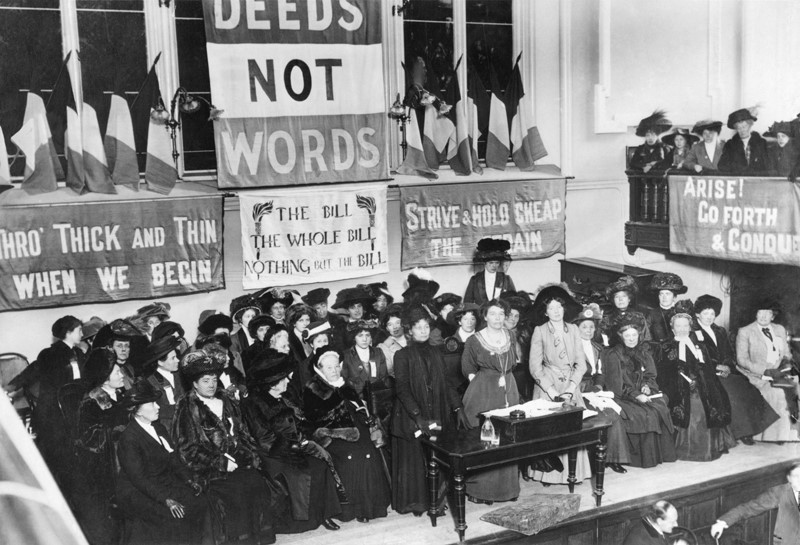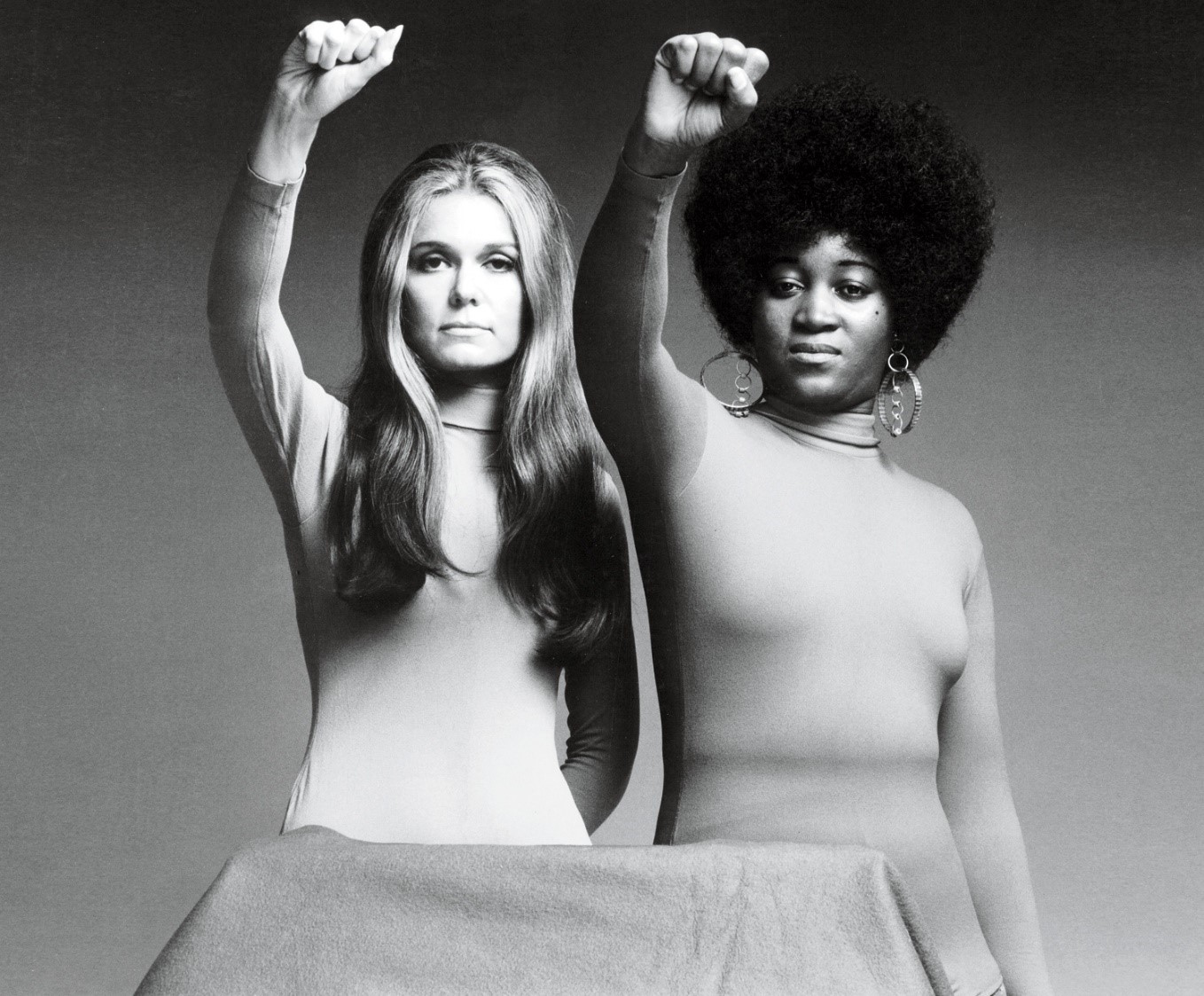In this post, Lauren Macmillan, who took the ‘Philosophical Britain‘ module at Queen Mary in 2015, writes about ‘Feminism’ as a philosophical keyword.
The Rise of the F Word: Feminism
In the build up to the 2015 general election, I can’t tell you how many times I was reminded ‘Your Vote Matters.’ As a woman, there’s no escaping the often vicious reminder that our foremothers died for our right to vote, and that any woman who abstains from voting is a disgrace to her sex. As a self-proclaimed feminist who chooses not to vote, this constant guilt tripping really bugs me.
Let’s clear something up: feminism is not simply about the right to vote – or at least, it’s not any more. Feminism has become a vast movement, advocating equality of the sexes by attempting to establish not only political, but economic and social rights of the female sex. Taking a step back almost two hundred years ago, the first recorded use of the word ‘feminism’ in the English language was in 1841, used to represent the quality or character of being feminine[1] – not what one would expect in light of the modern meaning of the word. By 1875, the term had became adapted to medical terminology, describing the appearance of female secondary sexual characteristics in a male individual.[2]
It was not until 1837 that the term ‘feminism’ became associated with women’s rights, when the French utopian socialist Charles Fourier (1772-1837) coined the term féminisme.[3] Fourier had previously expressed his support for women’s rights in his The Theory of the Four Movements and of the General Destinies (1808), where he compared the treatment of women in the Western world to that of slaves, concluding that ‘the extension of women’s privileges is the general principle for all social progress.’[4] As Fourier’s ideas, including the issue of women’s rights, became prominent during the 1848 European revolutions, the advocacy of female equality soon caught on in America and England. It was not until 1895 that the new meaning of the term ‘feminism’ was first recorded in the English language in an issue of the literary magazine the Athenaeum, and from the 1890s onwards this concept rapidly replaced the two previous uses of the word which are now almost completely disused. Deriving from the Latin femina, meaning woman,[5] it is unsurprising that the term ‘feminism’ has been associated explicitly with womanhood and the female body throughout its uses.
It was not until the emergence of the suffragette movement in the late nineteenth century that feminism became a widely recognised movement in Britain. The term ‘suffragette’ was originally applied to the women who fought for political enfranchisement as a term of ridicule in an article in the Daily Mail in 1906, but was soon embraced and became synonymous with those who used militant tactics in their campaigning.[6] The suffragettes advocated feminism on a political level, following half a century of campaigning for change in legislation, including the 1882 Married Women’s Property Act. Yet the lack of serious recognition for universal suffrage caused there to be a rise in the militant tactics deployed by the suffragettes, encouraged by Emmeline Pankhurst (1858-1928), a leading figure in the suffragette movement, and the founder of the Women’s Social and Political Union (WSPU), who stated ‘the condition of our sex is so deplorable that it is our duty to break the law in order to call attention to the reasons why we do it.’[7]

Figure 1: A suffragette meeting in Caxton Hall, Manchester, England circa 1908. Emmeline Pethick-Lawrence and Emmeline Pankhurst stand in the centre of the platform. Notice the emphasis on ‘Deeds Not Words,’ a motto which embodied the importance of the militant tactics the suffragettes advocated.
Through equating feminism with suffrage, the efforts of the suffragette campaigners secured the passing of the 1918 Equal Enfranchisement Act, which was extended in 1928. Although this was undeniably a huge milestone for women’s rights, an act of parliament could not simply eradicate the patriarchal structure of a nation that had supressed their right to vote in the first place. The suffragette movement had demonstrated that women wielded power extending far beyond political equality, which could only be achieved if feminism was adapted into everyday life.
As the century progressed, later feminists have identified the suffragette movement as the first of three waves of feminism.[8] After the two world wars, the term ‘feminism’ became more widely used in expressing how cultural and political attitudes towards women were inextricably linked. The phrase ‘Women’s Liberation’ became commonly ascribed to feminism in the 1960s during the so called second wave, and was popularised by the existentialist Simone de Beauvoir (1908-1986), whose revolutionary work The Second Sex (1949) was first published in English in 1953. The idea that female suppression was a cultural phenomenon, and not political, caused de Beauvoir to argue that feminism had to overcome the idea that ‘one is not born, but rather becomes, a woman.’[9] Other prominent figures, such as Betty Friedan (1921-2006) and Gloria Steinem (1934- ), advocated feminism as a need to rethink social norms and double standards imposed by a patriarchal society, and encouraged women to take on male roles in academia and the world of work. Academic feminist writing became more prominent in this period, such as Kate Millett’s (1934- ) Sexual Politics (1968) and Germaine Greer’s (1939- )The Female Eunuch (1970), equating feminism with sexual liberation.
The works of these women were extremely popular, and undeniably contributed to the Cultural Revolution in Britain now commonly referred to as the swinging sixties.
By the third wave of feminism in the 1990s, it had become impossible to use a universal definition of feminism due to the emergence of different underlying feminist issues. Many women, such as Audre Lorde (1934-1992), have heavily criticised earlier definitions of feminism for being solely concerned with the plight of the white cis middle class woman. There are a variety of organisations and movements, such as the Southall Black Sisters, and Queen Mary’s own QMEquality, which recognise the intersectional nature of feminism in relation to other oppressed sections of society, such as the LQBT+ community and black and ethnic minorities.
As well as the difficulties between feminists themselves in defining feminism for the modern woman, the term has experienced its fair share of criticism and ridicule in recent years as it has become a buzzword in popular culture. A wave of celebrities have come to define their image and work as feminist, including Emma Watson (1990- ) and Joseph Gordon-Levitt (1981- ), with many of them donning the This Is What A Feminist Looks Like T-shirt endorsed by the Fawcett Society and Elle magazine. Beyoncé (1981- ) now reigns supreme as the pop icon for the feminist movement, although she herself has qualms about identifying explicitly as a feminist.[10]

Figure 5: Emma Watson posing in the Fawcett Society’s ‘This Is What A Feminist Looks Like’ T-shirt, 2014.
In the recent rise of online forums and websites devoted to both academic and general discussion, including the Everyday Sexism Project, feminists have often come under attack for their use of the term ‘feminism.’ Some have criticised the term for its seemingly female centric implications, calling for the word to be replaced by ‘humanitarianism’ or ‘egalitarianism,’ whilst others are outright insulting in calling for a recognition of ‘menism.’ Many confuse the term ‘feminism’ with misandry, assuming all self-identifying feminists are radical, and have resorted to calling those who are outspoken on their feminist beliefs as ‘feminazis,’ somehow convinced the fight for gender equality will have the same outcome as the holocaust. The term ‘feminism’ was even suggested in a list of words to be banned in 2015 through an online poll conducted by Time magazine.
In an age where women’s rights and liberation has come so far, and has been adopted by so many different women to advocate so many different underlying issues, it is easy for the essential definition of the word to be lost, either intentionally or unintentionally, by those who use it. The word itself has developed from a political concept to embody a full scale social and cultural exploration of the way women can be emancipated. The sheer scale of the debate surrounding the definition of feminism today serves to demonstrate just how far we still have to go before complete gender equality can be achieved.
Further Reading:
Bell Hooks, Feminism Is For Everybody, (2000).
Betty Friedan, The Feminine Mystique, (1963)
Caitlin Moran, How To Be A Woman, (2011)
Mary Wollstonecraft, A Vindication of the Rights of Woman (1792)
Natasha Walter, The New Feminism (1999)
Bibliography
Bartley, Paula, Emmeline Pankhurst, (London: Routledge, 2002)
Baumgardner, Jennifer, F’em!: Goo Goo Gaga, and Some Thoughts on Balls, (Berkeley: Seal Press, 2011)
De Beauvoir, Simone, The Second Sex, (New York: Vintage Books, 1973)
Online Resources
Hare, Breeanna, ‘Beyoncé opens up on feminism, fame and marriage,’ (2014),
“feminism, n.” and “suffragette, n.” OED Online, (Oxford: Oxford University Press, March 2015), [Individual or institutional login required]
References
[1] “feminism, n.”. OED Online, (Oxford: Oxford University Press, March 2015)
[2] “feminism, n.”. OED Online, (Oxford: Oxford University Press, March 2015)
[3] “feminism, n.”. OED Online, (Oxford: Oxford University Press, March 2015)
[4] Charles Fourier, ‘Degradation of Women in Civilization,’ in Théorie des Quatre Mouvements et des Destinées Générales, (originally published in 1808).
[5] “feminism, n.”. OED Online, (Oxford: Oxford University Press, March 2015)
[6] “suffragette, n.”. OED Online, (Oxford: Oxford University Press, March 2015)
[7] Cited in Paula Bartley, Emmeline Pankhurst, (London: Routledge, 2002), p.98.
[8] Jennifer Baumgardner, F’em!: Goo Goo Gaga, and Some Thoughts on Balls, (Berkeley: Seal Press, 2011), p. 243.
[9] Simone de Beauvoir, The Second Sex, (New York: Vintage Books, 1973), p.301.
[10] Breeeanna Hare, ‘Beyoncé opens up on feminism, fame and marriage,’ (2014).


